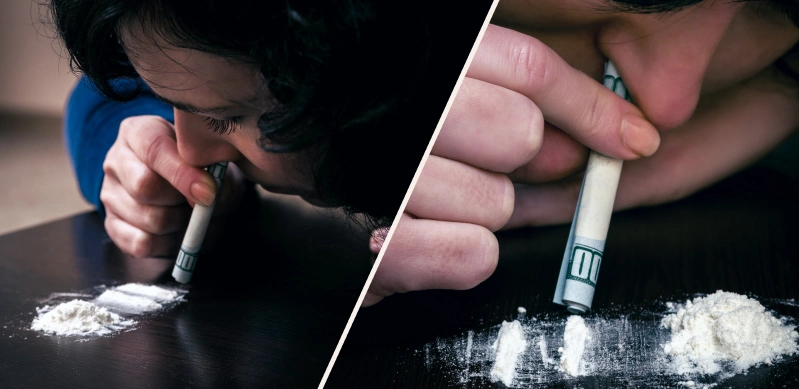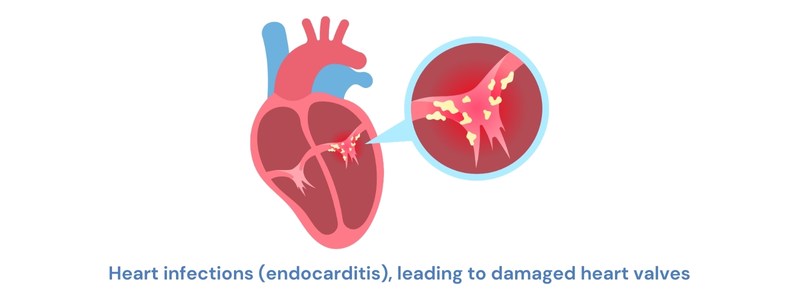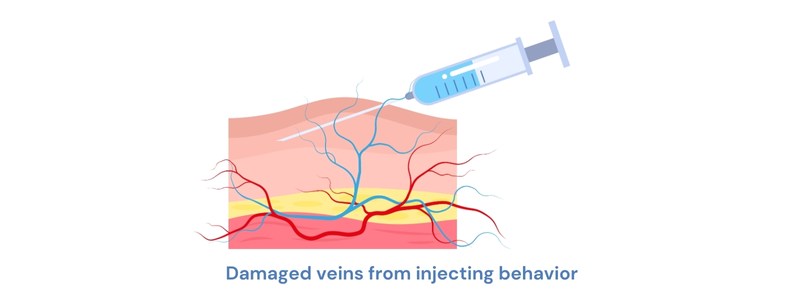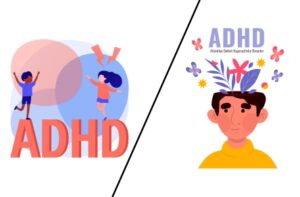
Why Do I Hear Voices in My Head?
Why Do I Hear Voices in My Head? Get Instant Relief Now! Have you ever experienced the sensation of hearing voices in your head? You

Heroin is a powerful opioid drug derived from morphine, which is known for its highly addictive nature and devastating effects on individuals and communities. Long-term heroin use can lead to a myriad of health issues, both physical and psychological, making it a significant public health concern.
In the United States, heroin use remains a serious problem, with millions of people affected by its use and abuse. According to the National Institute on Drug Abuse (NIDA), it’s estimated that around 808,000 people aged 12 or older used heroin in 2018, and the numbers have unfortunately been on the rise in recent years.
This alarming trend underscores the importance of understanding the issues related to long-term heroin use and finding effective ways to address them.
Long-term heroin use can have profound effects on the brain, altering its structure and function. When heroin enters the brain, it is converted into morphine and binds to opioid receptors, particularly those involved in the perception of pain and reward. This leads to a flood of dopamine, a neurotransmitter associated with pleasure, reinforcing the desire to continue using the drug.
Over time, the brain becomes dependent on heroin to function normally, and the individual may experience cravings and withdrawal symptoms when not using. Chronic heroin use can also lead to changes in brain circuits involved in decision-making, judgment, and behavior control, making it difficult for users to quit even when they want to.
Alcohol and mental health are closely intertwined, and the relationship between them can be complex. While many people may drink alcohol as a way to relax or socialize, excessive or long-term alcohol use can have serious consequences for mental health.
Alcohol is a central nervous system depressant, meaning it slows down brain function. While it might provide temporary relief from stress or anxiety, over time, it can worsen symptoms of mental health disorders and lead to the development of new ones.
Additionally, individuals with mental health conditions may be more likely to turn to alcohol as a form of self-medication, further exacerbating their symptoms.
Mental Health Disorder | Description |
Anxiety Disorders | Excessive alcohol use can exacerbate symptoms of anxiety disorders such as generalized anxiety disorder (GAD), panic disorder, and social anxiety disorder. |
Depression | Alcohol is a depressant and can worsen symptoms of depression, leading to low mood, hopelessness, and suicidal thoughts. |
Bipolar Disorder | Alcohol use can trigger manic episodes in individuals with bipolar disorder and worsen depressive episodes. |
Post-Traumatic Stress Disorder (PTSD) | Individuals with PTSD may turn to alcohol as a way to cope with trauma, but this can lead to increased symptoms and impaired functioning. |
Schizophrenia | Alcohol can interact with antipsychotic medications and worsen symptoms of schizophrenia, including hallucinations and delusions. |
Understanding the relationship between alcohol and mental health is crucial for effective treatment and support. If you or someone you know is struggling with alcohol use or mental health issues, it’s important to seek help from a healthcare professional.
Heroin is a powerful opioid drug that can have immediate and profound effects on the body and mind. The short-term effects of heroin use can be intense and may include:
Euphoria and feelings of pleasure: Heroin binds to opioid receptors in the brain, leading to a rush of euphoria and pleasure. This intense feeling of happiness is often referred to as a “rush” and is a primary reason why individuals use heroin.
Drowsiness and sedation: Heroin depresses the central nervous system, leading to drowsiness, sedation, and a feeling of heaviness in the limbs. Many individuals using heroin will nod in and out of consciousness.
Clouded mental functioning: Heroin use can impair cognitive function, leading to confusion, difficulty concentrating, and impaired judgment. This can increase the risk of accidents and injuries.
Slowed heart rate and breathing: Heroin use can slow down heart rate and breathing, which can be dangerous, especially in cases of overdose.
Nausea and vomiting: Many individuals experience nausea and may vomit shortly after using heroin.
Dry mouth: Heroin can cause dry mouth, also known as “cottonmouth,” which can be uncomfortable.
Itching and flushed skin: Heroin use can cause itching and flushed skin, often accompanied by a warm feeling throughout the body.
Constricted pupils: One of the most recognizable signs of heroin use is constricted (small) pupils, also known as “pinpoint pupils.”
Long-term heroin use can have devastating effects on both physical and mental health. The chronic use of heroin can lead to a wide range of health problems, including:
 Severe constipation: Heroin use can slow down bowel function, leading to severe constipation and gastrointestinal issues. Chronic constipation can cause discomfort, pain, and, in severe cases, bowel obstruction.
Severe constipation: Heroin use can slow down bowel function, leading to severe constipation and gastrointestinal issues. Chronic constipation can cause discomfort, pain, and, in severe cases, bowel obstruction.

Dental problems: Heroin use can cause significant dental issues, including tooth decay, gum disease, and tooth loss. This is often referred to as “meth mouth,” characterized by extensive tooth decay, gum disease, and tooth loss, which can have a severe impact on a person’s overall health and quality of life.

Loss of appetite: Chronic heroin use can lead to a loss of appetite and significant weight loss. Poor nutrition and weight loss can weaken the immune system, making individuals more susceptible to infections and other health problems.

Menstrual and fertility problems (in females): Heroin use can disrupt menstrual cycles and lead to fertility issues in women. Irregular or absent menstrual cycles can make it difficult for women to conceive and carry a pregnancy to term.

Loss of sex drive (in men): Heroin use can decrease testosterone levels in men, leading to a loss of sex drive and potential erectile dysfunction. Chronic heroin use can also affect reproductive function and fertility in men.

Mood swings, depression, anxiety, and confusion: Long-term heroin use can lead to significant changes in mood, including mood swings, depression, anxiety, and confusion. These mental health issues can have a profound impact on a person’s quality of life and ability to function in daily life.

Skin and lung infections: Heroin users are at an increased risk of developing skin and lung infections, particularly if they inject the drug. Skin infections can occur at the injection site and may lead to abscesses, cellulitis, and other serious complications. Lung infections, such as pneumonia and tuberculosis, are also common among heroin users.

Heart infections (endocarditis), leading to damaged heart valves: Heroin use can increase the risk of developing endocarditis, a serious infection of the heart valves that can lead to permanent damage. Endocarditis is a life-threatening condition that requires prompt medical treatment.

Severe blood infections: Heroin users are at an increased risk of developing severe blood infections, which can be life-threatening. Injection drug use, needle sharing, and poor injection practices can introduce bacteria and other pathogens into the bloodstream, leading to serious infections such as sepsis and bacteremia.

Damaged veins from injecting behavior: Injecting heroin can lead to damaged veins, scarring, and the development of abscesses. Chronic venous damage can make it difficult for individuals to inject heroin and may lead to other complications, such as deep vein thrombosis and pulmonary embolism.

Blood-borne infections such as hepatitis B, hepatitis C, and HIV: Heroin users are at an increased risk of contracting blood-borne infections due to needle sharing and risky injection behaviors. Hepatitis B, hepatitis C, and HIV are serious viral infections that can have long-term health consequences if left untreated.
Alcoholism, or alcohol use disorder (AUD), can have profound psychological effects on individuals and their loved ones. Chronic and excessive alcohol consumption can lead to a range of mental health issues. These may include depression, as alcohol is a depressant that can worsen symptoms and increase the risk of developing a depressive disorder.
Additionally, alcohol abuse can lead to increased feelings of anxiety and panic, impair judgment and decision-making abilities, cause memory problems such as blackouts and cognitive impairment, and result in significant mood swings and personality changes. These psychological effects can have a substantial impact on a person’s quality of life, relationships, and overall well-being.
Seeking help from a healthcare professional or addiction treatment center is crucial for individuals struggling with alcoholism to address these psychological issues and regain control of their lives.
Combining heroin with other drugs or alcohol can have dangerous and potentially deadly consequences. Polydrug use, or the concurrent use of multiple substances, is common among individuals struggling with addiction. When heroin is used in combination with other substances, it can amplify the effects of both drugs and increase the risk of overdose and other health complications.
Using multiple substances together not only increases the risk of overdose and death but also complicates the treatment process. If you or someone you know is struggling with substance abuse or addiction, it’s essential to seek help from a healthcare professional or addiction treatment center. They can provide the support and resources needed to overcome addiction and regain control of your life.
Long-term heroin use can have devastating effects on both physical and mental health. From severe constipation and dental problems to mood swings, depression, and anxiety, the consequences of heroin addiction are far-reaching and profound. Additionally, combining heroin with other drugs or alcohol can increase the risk of overdose and other serious health complications.
Recognizing the issues related to long-term heroin use is the first step toward seeking help and finding effective treatment options. If you or someone you know is struggling with heroin addiction, it’s essential to reach out to a healthcare professional or addiction treatment center for support and guidance on the path to recovery.

Why Do I Hear Voices in My Head? Get Instant Relief Now! Have you ever experienced the sensation of hearing voices in your head? You

How Long Do Depressive Episodes Last? Understanding the Duration Get Instant Relief Now! Dealing with depressive episodes can be challenging, especially when it comes to

The ADHD–Rejection Sensitivity Dysphoria (RSD) Connection When we talk about ADHD Attention Deficit Hyperactivity Disorder, most people think of inattention, impulsivity, or hyperactivity. But there’s
